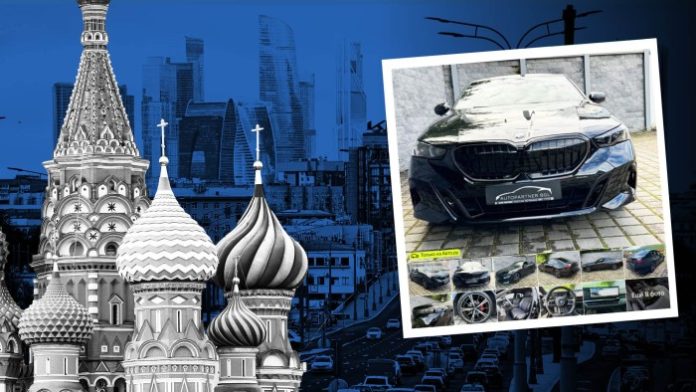Unlock the Editor’s Digest for free
Roula Khalaf, Editor of the FT, selects her favourite stories in this weekly newsletter.
Russian smugglers are charging tens of thousands of euros to import luxury cars from Europe, as EU sanctions in response to Moscow’s full-scale invasion of Ukraine hit the country’s wealthy.
The Financial Times has identified five Russian companies offering to smuggle cars from Europe with engine sizes sufficient to come under EU sanctions, which were imposed in 2022 as part of a ban on the export of luxury goods to the country.
Pictures for an online advertisement from the Russian importer AvtoImport on the website Auto.ru for a BMW 530 d M Sport priced at Rbs7,200,070 ($68,200) show that the car is still in Germany.
As of mid-December, the vehicle was still on sale for €31,900 on the website of German seller Autopartner BGL.
“The ads that are running in Russia have nothing to do with us,” said a representative of Autopartner BGL, confirming that the car in question was still in Germany and had not been sold as of mid-December.
The FT identified more than 50 luxury cars from 25 different German car dealerships on the Russian website Auto.ru, which Russian importers were offering at an average mark-up of about €19,000.
© Auto.ru
Smugglers often present themselves as intending to ship the car to a third country. The FT has traced a black Mercedes-Benz S350 sold in January 2024 to a Kyrgyz cab company by German car trader Kessler & Haag. The vehicle was registered in March to a Moscow taxi company.
“We have a buyer, a payer, an exporter, he has export documents. What else should we do?” said Artur Kessler, a representative of Kessler & Haag. “I don’t want to know what happens to the cars after . . . I just want to run my business, comply with my duties and rights.”
The supply of European cars to Russia comes despite the EU boosting sanctions since President Vladimir Putin ordered the full-scale invasion of Ukraine, in an effort to choke Moscow’s war machine and provoke dissatisfaction with the regime.
Since the EU tightened restrictions in July on luxury goods entering Belarus — once a popular third country through which to import to Russia — smugglers are using increasingly long and expensive routes to ship the vehicles.
A sales representative for AvtoImport told an FT reporter posing as a prospective buyer that German cars shipped from Europe “are transported not via . . . Belarus . . . but through Turkey, Georgia, and then into Russia”.
“Exporting cars from Europe has become extremely challenging,” the person added.
They said it was now cheaper and faster to smuggle high-end German cars via South Korea than through the Baltics and Belarus, noting that the Asian country had imposed “minimal” sanctions on Russia.
For a cost of only about Rbs30,000, they added, the car’s on-board systems could be switched from Korean into Russian.
A customs official in a Baltic country confirmed that suspicious car exports from Germany had declined since the Belarus sanctions were updated.
“The overall situation is that numbers of cars [are] decreasing, but there [is] still some flow,” the official said. “There are still some cars that end up in Russia, originally destined for central Asian countries” such as Kyrgyzstan and Kazakhstan.
However, the FT still identified vehicles that had been transported through Belarus since the tightening of the sanctions.
A white Mercedes-Benz E220D with a licence plate frame from German car seller Gruma Automobile was photographed in Russia this autumn, after it crossed the EU’s external border in September into Belarus. Gruma Automobile’s sales chief Michael Vieweger denied selling the car, and said that “we do not conduct any business with companies, organisations or persons based in embargoed countries”.
Several German car sellers contacted by the FT said they were not aware that their cars were being sold to Russia or advertised on Russian websites.
Markus Klapper of Autohaus Reisert said he had not seen Russian advertisements for his vehicles, but he knew of the tactic whereby brokers copied details and images from dealers’ websites so they could re-sell vehicles at a mark-up.
He suggested that Russian smugglers could be employing a similar strategy. The FT identified several cars with Autohaus Reisert licence plates advertised on Auto.ru.
EU officials are aware that luxury cars are still ending up in Russia, but their main focus is now on tackling sanctions evasion relating to more dangerous goods that can be used by the military.
An EU official working on sanctions said the fact that luxury cars still ended up in Russia was “undoubtedly a bit murky”, but that it was not a major concern “as long as Russia is paying more for these”.
The official also acknowledged that the EU’s sanctions against Belarus were not as stringent as those it had imposed on Russia, meaning that some cars can still be exported to Belarus.
A law enforcement official working on sanctions enforcement said “the Belarus sanctions did have an impact — but they will always have a way out”.




